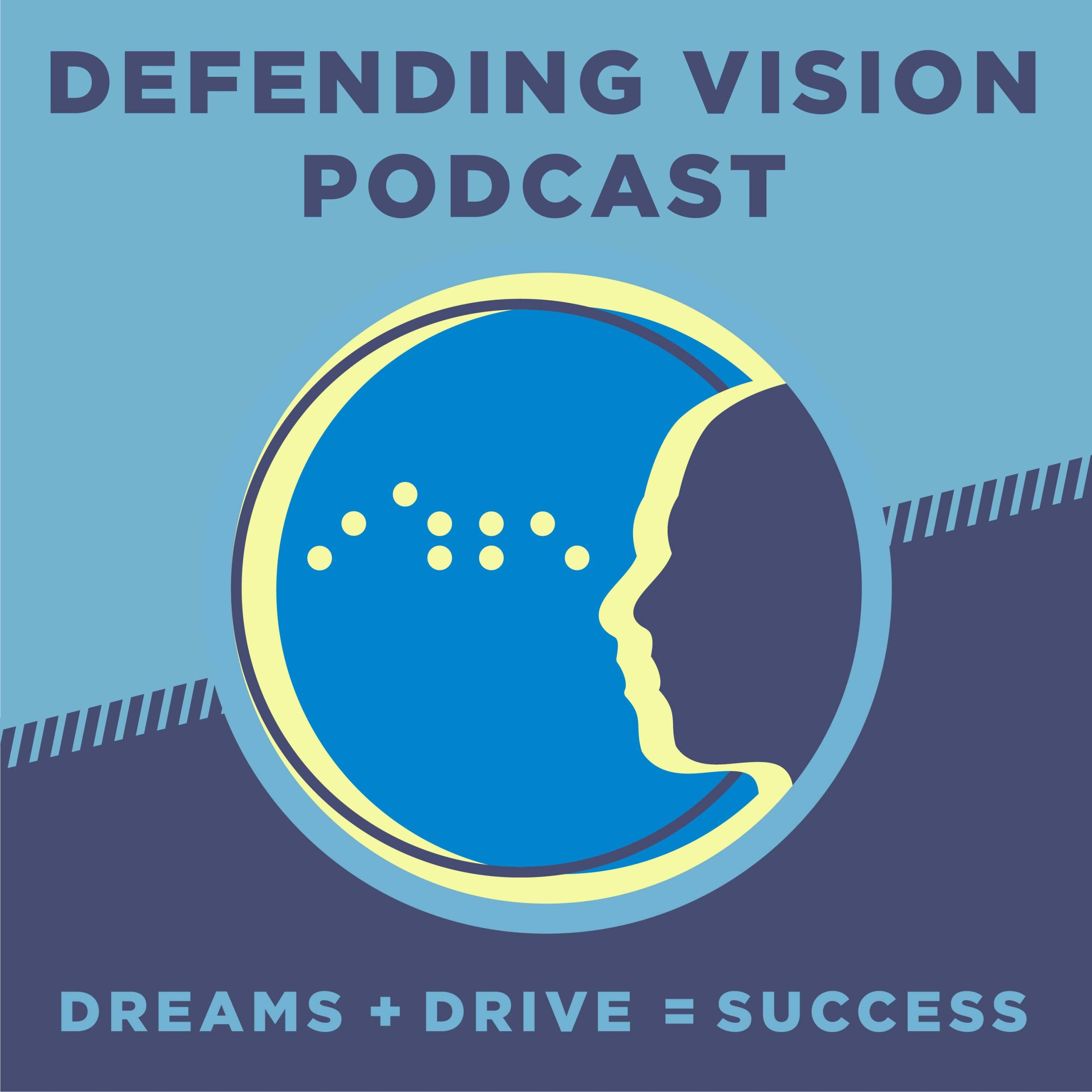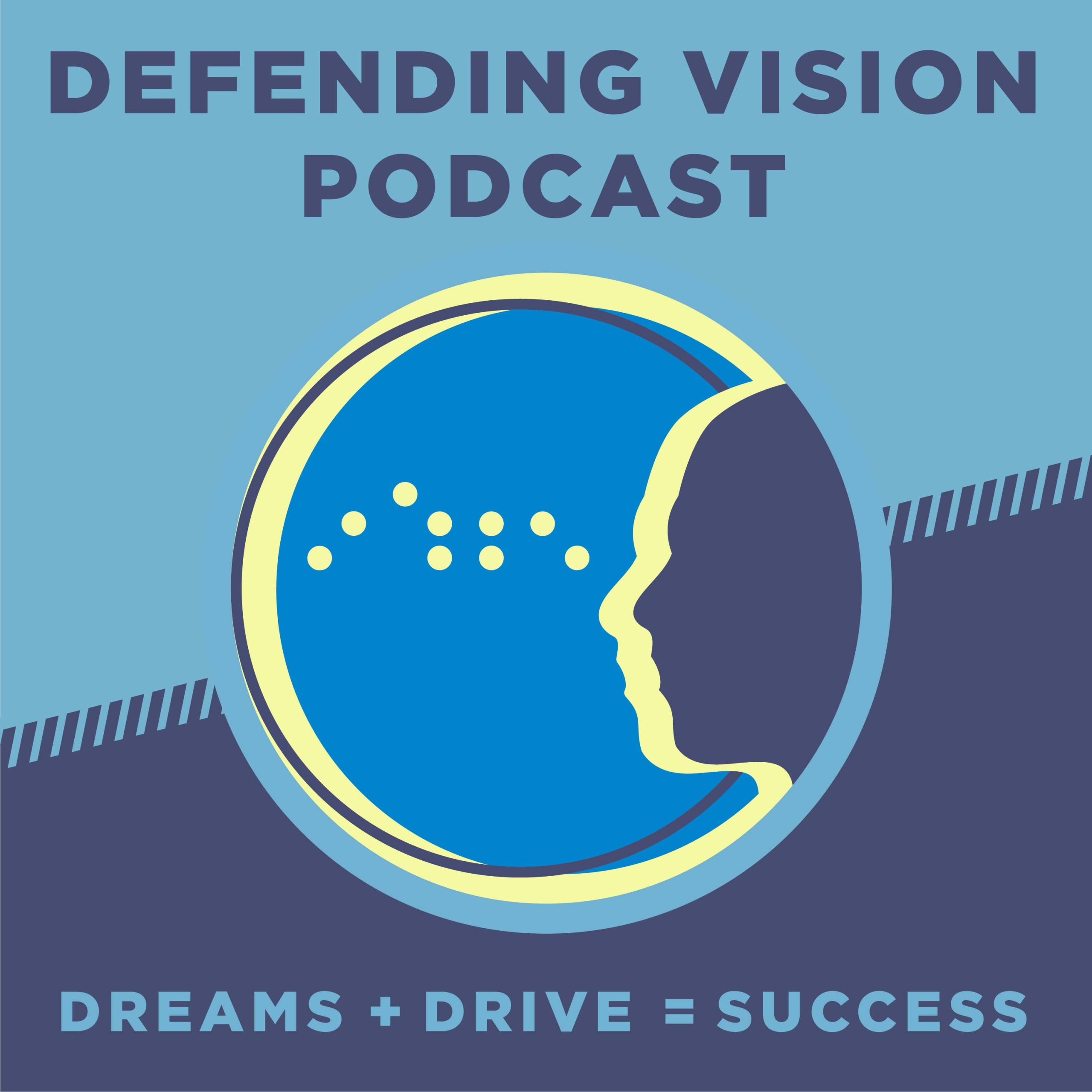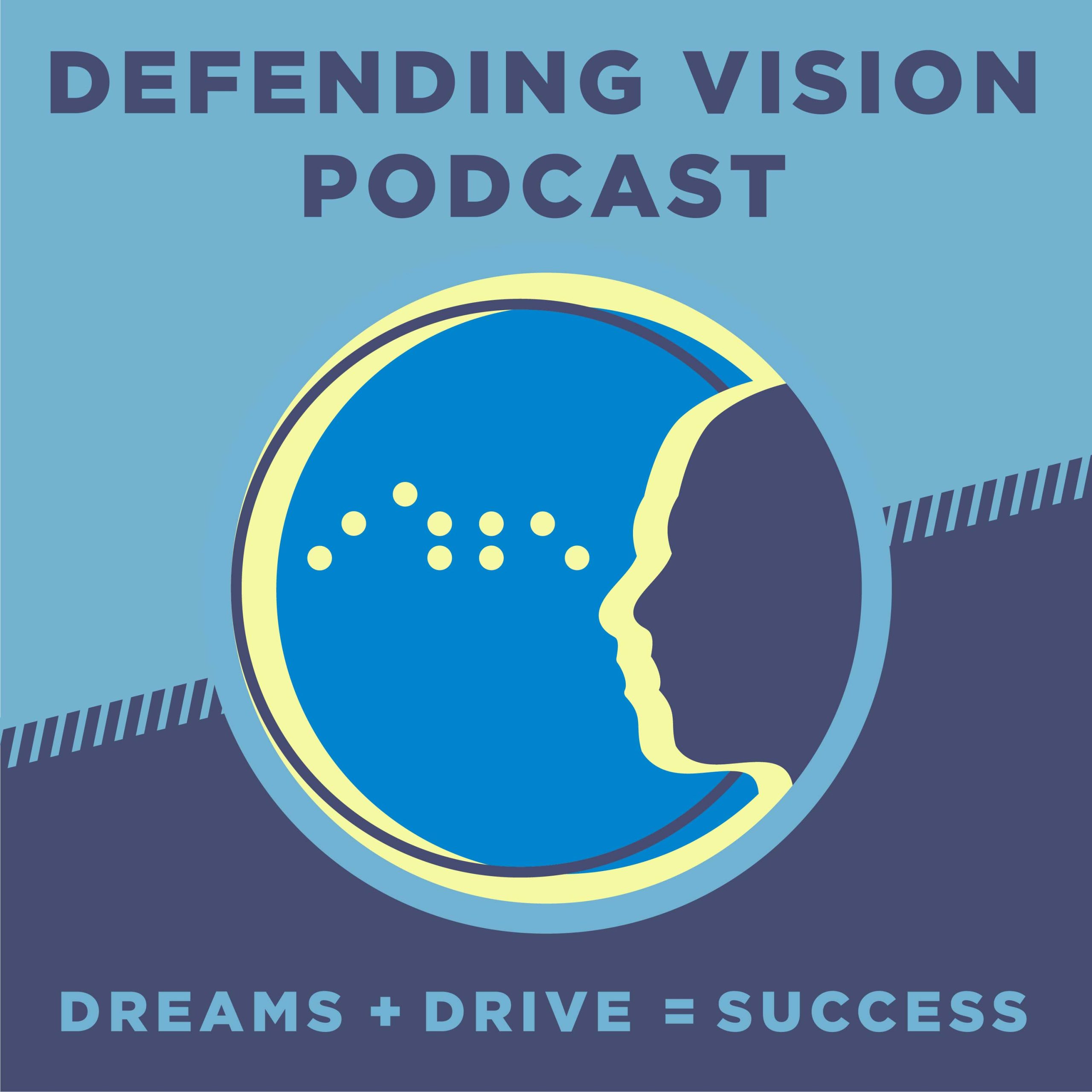Episode Transcript
[00:00:03] Welcome to the Defending Vision podcast, where this blind man shows you exactly how he sees it, stories of hardship, humor, and keeping a vision alive.
[00:00:14] Throw on some headphones for the full audio experience.
[00:00:21] Alright, here we are in episode one of the defending Vision podcast. Bear with me, I've got a lot to learn in this process.
[00:00:29] My name is Matthew Cooper and I am so thankful that you're giving the show a try. I figure there are two possibilities. Either you stumbled across it and have nothing better to do, or you're a friend or family member listening out of obligation. Either way, thanks again.
[00:00:45] This episode is all about introductions, introducing myself, this show, and the defending vision project. Overall, if youve read the show description, you at least know one thing about me. I am completely blind. This is certainly not enough to warrant creating an entire podcast, but it is the thing about which people initially start asking questions. To give a brief overview I was born in northern California and grew up there through 7th grade. I then spent 8th grade in high school living in Durham, North Carolina. The reason for this move will certainly be discussed in later episodes. I ultimately moved out to California for college at Stanford University and began my career as an electrical engineer in the tech industry, which has now been about ten years.
[00:01:30] Today I live in the Florida panhandle near family and am loving every minute of it. So as I said, I am completely blind. I was originally diagnosed with vision loss at three years old. My parents had been wondering for a while if I had some vision issues. I would, for example, reach for a toy miss and then recover to find it by sweeping my hand around. My mom had worn glasses since a young age, so this didnt seem too surprising at first. As it turns out though, it is very difficult to test the visual acuity of a young child. The doctors gave my parents some ideas. Ask him what color the sky is. Ask him whats flying overhead or what is on the side of the road as we drive in the car.
[00:02:12] So every child has heard the storybooks so I knew the sky was blue. I quickly learned that that sound overhead was an airplane, and given that we lived in an area with a lot of dairies, I knew that cows was a fairly safe guess everywhere we went. Anyway, further testing would ultimately find a tumor where the optic nerves cross as they go from the eyes back to the brain. A juvenile pilocytic astrocytoma. Still a mouthful as far as I'm concerned, this tumor is considered malignant by location. So while it is not particularly aggressive or fast growing, it is in a location near many sensitive parts of the brain. Shortly after the diagnosis, a neurosurgeon removed roughly 60% of the tumor, leaving the rest to avoid any additional damage during surgery. At this time, my vision was limited to only my right eye. High contrast shapes and shadows, no color. My first memories, as it turns out, are from the hospital just after this surgery. Since then, I have been on some form of chemotherapy most of my life. The primary aim of all of these treatments being to keep the tumor stable, as we call it, both in size and activity.
[00:03:25] While the treatments have generally been successful, my vision did continue to degrade until I was considered completely blind roughly 20 years ago. I definitely plan on diving deeper into my medical history with you, and I also hope to bring on others to share their own stories. There are so many people suffering from all sorts of illnesses, and this is really a universal subject.
[00:03:48] Personally, I've always tried to live as though the medical and blindness challenges are really a backdrop on which my true story is playing out.
[00:03:59] They're there. I can't deny them. I have to deal with them. Regular mris to monitor the state of the tumor, some chemotherapies that make you feel absolutely awful, and others that are easier to deal with. So if I were to choose the things that would be included in my biography, I guess it'd be a little bit more like this.
[00:04:19] From an early age, I began public speaking.
[00:04:22] Initially it was presentations about braille to the local PEO and rotary chapters. And later I had the distinct honor of speaking on behalf of great organizations like Blind Babies foundation in California, Duke Children's Hospital, and the Children's Miracle Network. I got to meet some truly incredible people at the events for these organizations. At eleven years old, with a lot of hard work and thanks to the youth program at a small guide dog school in Quebec, Canada, I became only the second eleven year old to receive a dog. I am now on my fifth guide walker. Every dog has been unique, an important companion during a phase of life. Junior high, high school graduation, college, and into the workplace.
[00:05:10] Speaking of academics, school was definitely a challenge. Full of highs and lows. I had everything from teachers saying he doesn't need to do math, he'll never use it, to a high school physics teacher who went out of his way to make sure that I was engaged and hands on with every subject. With the tremendous support and advocacy of my parents, I managed to achieve academically and ultimately graduated from Stanford University.
[00:05:35] Since then, I have embarked on a ten year career as an electrical engineer.
[00:05:40] It's these things that I just described that tend to cause people to say that I am inspirational, amazing or trailblazing whatever phrase they choose. Ive had friends, family and strangers that I meet in the airport tell me I need to write a book about my life and experiences.
[00:05:57] They say it would be motivational or inspirational to others as they go through their own troubles.
[00:06:03] Perhaps this is true, but im not a writer by nature and I knew that I would need more of a message than just my own story. After all its just ordinary every day from my perspective.
[00:06:15] I think I have found that message and I believe the podcast medium is a great place to start where I can talk directly to you.
[00:06:23] Now what is that message? Simple. I am here to defend vision.
[00:06:29] Now I am not referring to eyesight. Im not going to sit here and tell you how amazing having good eyesight is. Frankly, most of you listening should already know that and not take it for granted. Im also not a researcher looking for cures to blindness.
[00:06:44] I'm referring to a different definition of vision. The Cambridge dictionary summarizes this other definition as a view of the future.
[00:06:52] This is a pretty big definition. This encompasses our goals, our dreams, our purpose, our outlook for how things could be down the road.
[00:07:02] So let's do a quick thought experiment. Imagine somebody calls you and says that a mutual friend has lost their vision. How would you interpret that? My guess is that your first thought is that they have gone blind. They've lost their eyesight. In other words.
[00:07:17] However, imagine that instead they told you that your friend had lost their view of the future, had lost their vision.
[00:07:26] In my own opinion, this is a much graver loss than the loss of eyesight. I will never diminish the challenges of being blind. They are many, they are unique. Unfortunately, however, blind adults and children are often convinced or forced to give up their view of the future. They are told that there are things they just can't do. Goals may change, and the path to attaining them may be difficult, but don't be too quick to give them up. As I see it, everyone on planet Earth has something they will deal with their entire life. It might be blindness, deafness, a physical handicap, a mental illness, addiction, or something else. Maybe that doesn't have an official diagnosis or name. Ultimately, we will all struggle with something. One option, of course, is to focus on this obstacle, difficulty, or challenge. But I don't think that gets anyone very far, and it will certainly rob a lot of joy out of life. Personally, I like to look at it a little bit differently. I could focus on my blindness, but that doesn't seem like much fun rather, I'd like to focus on my vision.
[00:08:37] What do I want for my life? What do I want to accomplish?
[00:08:41] Who do I want to meet? Who do I want to surround myself with? Where do I want to go? This leads me to two questions I believe everyone should ask themselves.
[00:08:50] First, do you have a vision? And if so, what is it? What are you striving for? What do you want?
[00:08:58] How badly do you want it?
[00:09:01] Now if you say yes, I have a vision and I know what it is, excellent. There's a second question. What are you going to do about it? Are you going to chase it? Are you going to go after it? Or are you going to ignore it and turn away? Of course, life is constantly throwing things at us that take up our time and attention. So I'm not saying that we can constantly be making massive strides toward our goals. However, every day I believe there's at least one baby step we can take. Every step will encourage the next.
[00:09:32] So in this podcast, my goal is to share the times when my vision was challenged and the ways in which I defended it. We will also have others on the show to talk about ways in which they did the same in their own life. I am certainly not the only person with an interesting story to tell for blind individuals that find this show. I hope that they will find advice, tricks of the trade and camaraderie. When things are tough, I'm going to talk about the big and the small things that we deal with every day. Many of these things never occur to even our closest friends and family.
[00:10:07] Now, to the friends and family of those blind individuals, I've got a little bit of tough love for you. I'm going to be challenging you. I'm going to challenge you to shelter your loved one a little bit less. And I'm going to challenge you to push them as they strive for bigger and bigger achievements.
[00:10:25] There are going to be days you have to see them cry. My parents, my family, my friends, they've all seen it. It's hard. I know it's going to be tough on those days, but I really believe that your job as part of our support system is to help us find and reach our goals.
[00:10:42] Now for the teachers, the professors, the employers, and others, as you listen to these stories, I want you to remember one thing.
[00:10:50] Just because you cannot imagine living without your eyesight, it doesnt mean that those of us without it havent found a way.
[00:10:58] And we might just bring an interesting perspective to your classroom or your workplace. So, seems worth giving it a shot.
[00:11:07] As I've already said blindness is part of my story, but it is not the subject of this show. So don't think I'm only speaking to a few groups in particular.
[00:11:16] Everyone is looking for meaning, fulfillment, purpose.
[00:11:21] At best I'll share some wisdom and encouragement and at worst I'll share some laughter for everyone.
[00:11:28] Now, as excited as I am for all of that, and I think there are going to be some really interesting conversations. Theres one more goal for this show.
[00:11:37] I wanted to do more than just talk on this podcast.
[00:11:40] I wanted the act of listening to this show to teach everyone something about living as a blind person.
[00:11:48] Quite often I think people find the idea of absolutely terrifying.
[00:11:52] At the same time its almost a cliche to hear that just because you lose your vision, suddenly you must have a super sense of smell, taste and hearing.
[00:12:03] There is scientific evidence showing that when one sense is lost, others may improve.
[00:12:09] For example, researchers at Johns Hopkins University found activity in the visual center of the brain when some blind individuals were asked to solve math problems. This seemed to show that the brain had actually repurposed that area for computation since it wasn't being used to see. It's my belief, but I am certainly not a neurobiologist, that the brain focuses its resources on things it tends to do the most. So I don't believe it is the loss of eyesight that causes hearing to get better. But instead it is relying on hearing that informs the brain that every available resource should be put toward that task.
[00:12:49] I wasn't born with the ability to walk into a room and roughly estimate its size and shape based on the sound. Rather, ive spent a lifetime practicing because I needed a way to understand my environment as quickly as possible. 10,000 hours of practice makes perfect. They say parts of this show are going to be recorded a little bit differently. Im going to be recording them with a true 360 degree microphone. This will provide a truly realistic experience. You will be able to hear where things are coming from as they move. In particular cases I will stop and specifically describe what I am listening to in the environment and what it is telling me. I hope that over time this will actually help people understand both the capabilities and the limitations of hearing. It's these segments that are best listened to on headphones. As noted in the intro to the show, I'll do everything I can to keep the listening experience as good as possible for anyone who is not.
[00:13:49] As a quick test for the first episode, I thought it might be fun to give you a quick tour of the studio. After all, sighted listeners are used to watching YouTube videos of their favorite podcasters and getting to see their backgrounds. So why shouldn't everyone on my show be able to do the same?
[00:14:09] Alright, welcome to the studio. Here we are. So I'm standing at the desk here in the front of the room and I've got the microphone placed on the desk straight in front of me. So if you're listening on headphones, you'll hear me directly in front of you.
[00:14:24] In between me and the spherical mic, I have the microphone I usually use for recording. I kind of tap on the mic stand here.
[00:14:32] You can kind of hear that. It's a little quiet. Alright, so I'm just going to walk around the room a little bit, show you what we've got. So as I go over this direction, I've got a rack here with my audio interfaces and some other equipment.
[00:14:46] And I'm going to go ahead and come along here. I've got a mic stand all along each wall I've got acoustic panels. Shout out to Ethan and Sean at realtraps for these products.
[00:15:00] Coming back to the back side of the room. Here we are. And I've got a row of acoustic panels here as well.
[00:15:07] Bottom is some big absorbers, the top is a little bit different. They're diffusers. So it sounds a little different here as I run my hand across it.
[00:15:16] Alright, so now I'm going to keep going, going to the other back corner of the room and as I get in here it'll sound a little bit different. I'm going to go ahead and open the door. You can hear the acoustics change for the rest of the space. Alright. Yeah, you can really hear that difference. Wish the whole place sounded like the studio.
[00:15:35] Alright, so we close that back up. That's nice. More acoustic panels on this side and I've got a twelve string guitar sitting here on a stand.
[00:15:46] Alright, now just to show you, I'm going to kind of come up on this side. I've got a couple keyboards here, a couple different nice playable keyboard and a little midi controller here as well. So now I'm just going to come back sort of the center of the room and approaching the desk again. Alright, that's the space.
[00:16:13] And now we're back to the normal recording setup. I hope you enjoyed that.
[00:16:17] To get things started, I'll release a full episode every other week. Interspersed in between I'm going to put out some shorter ones where we'll talk shop on the various projects and hobbies I have going on these days. So for those interested in how I do things, like 3d printing and music recording. Come on by. I think you'll enjoy it.
[00:16:38] Thanks again for giving this show a try and I hope you'll come back and join me on this new adventure.
[00:16:46] If you would like to learn more, go to defendingvision.com and if you enjoyed the show, rate, review and subscribe on Apple Podcasts, Google, Spotify, or wherever you find your podcasts. Thanks for listening.


